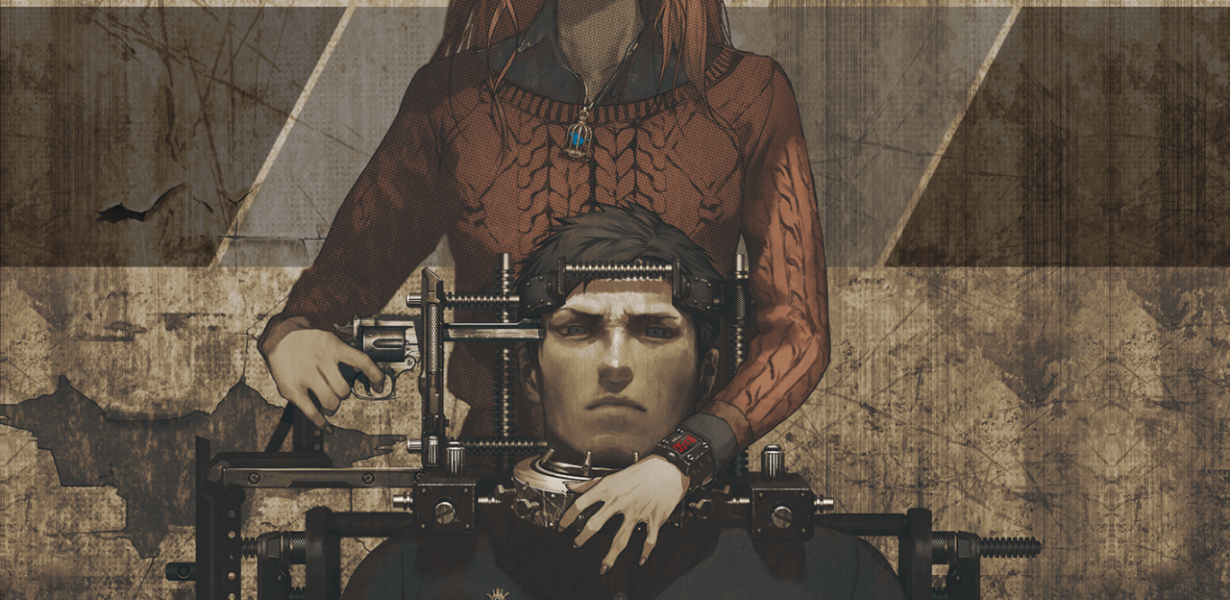Unlike most Japanese visual novels, the Zero Escape series actually ended up being a lot more popular in the west than in Japan. Granted, it was still often overlooked by gamers in English-speaking territories and it doesn’t quite have the same amount of popularity as something like, say, Ace Attorney or Persona, but Zero Escape has gathered quite the enthusiastic cult following over the years.
To explain why the Zero Escape series is so special would be like trying to explain why I love stories in video games. The series kicked off with 9 Hours, 9 Persons, 9 Doors back in 2009 on the Nintendo DS, and it told a compelling tale about nine strangers trapped on a cruise ship by a masked man named Zero. Using something called a Digital Root, they were each equipped with cool-looking bracelets with numbers that determined who could enter certain rooms. In order to escape, they would have to split up and pass through numbered doors to solve various locked room puzzles. Once they found a door marked with the number ‘9,’ they just had to pass through it to escape.
The plot thickens as you progress, and you start to learn more about your fellow captives and why they’ve been chosen to play this Nonary Game. And of course, you also start to form your own theories about who Zero could be and why he’s trapping all of you on this sinking ship.

Even though the conclusion felt so darn satisfying, the ending still left many fans theorizing and speculating about some plot points that Aksys even posted an in-depth FAQ on their site, answering any pressing questions fans had.
Virtue’s Last Reward is the direct sequel to 999 and it follows that same visual novel formula of having you solve locked room puzzles and reading lots of text outside of that. The plot goes even deeper, the stakes are higher, and what seemed like an enclosed, personal event in 999 suddenly blows up and becomes much bigger than the captives themselves. Players get to make decisions about which doors they go through in both Nonary Games, which captives they decide to ally with, and then they get to witness the consequences of their decisions.
Zero Escape doesn’t shy away from morbidity and death, and it underscores some of its gory moments with a layer of dark humor and mystery. It’s so good at giving you answers to the game’s mysteries, and then presenting you with even more oddities and questions to keep you playing through the night. It’s that kind of game.
Also, you get some seriously funny moments like these.

Perhaps the coolest thing about the Zero Escape series is that it manages to tell an interactive story that can only be told through video games; it simply wouldn’t work as a movie or TV show. It’s a very subtle inclusion, but both games in the series so far have managed to suck the player into its world, giving you a sense of responsibility over what happens to the protagonists and the other captives. Without going into spoiler territory, the Zero Escape games are wonderful because they succeed not only at telling a good story, but at telling a good video game story that makes the player feel responsible for its progress.
What’s interesting is that despite all my praise for the series and how awesome I’ve made it sound, the third and final entry of the trilogy, titled Zero Time Dilemma, almost didn’t get made. Back in 2014, series creator Kotaro Uchikoshi sent out a series of really upsetting tweets, talking about the state of the third game. In short, Zero Escape was in the red in Japan, and Uchikoshi simply couldn’t convince the higher-ups that making the third game would be a good business decision. He went on to say that he still had hope that the third game would be made someday, but continued to apologize to series fans for his “inadequacy.” It was pretty depressing.
After finding out about the true state of the series and how poorly it was doing sales-wise, fans rallied together in an effort to save the project. Most notably, the Facebook pageOperation Bluebird was created, and it brought together fans of the series, encouraging them to share pictures of their game copies, as well as other series related merchandise. 999 had also received an Android and iOS port around that time, and that was what fans used to spread word of the series around. It was essentially a watered down version of 999 that gave you the full story without any of the puzzles. It was pretty cheap, and it was an easy recommendation to anyone who might be interested.
A little more than a year passed, and fans still didn’t have any news about the development of the third game. Then the summer of 2015 came around, and Uchikoshi surprised fans with the announcement of Zero Time Dilemma, the third game that everyone had been waiting for. After all the crazy support from fans, the rally to drum up support for the series, all the awesome music covers that fans made to show their love, the efforts made to encourage people to check out the mobile port of 999, and just the sheer act of advertising the game through word of mouth, the project finally became a reality. It was an incredible moment.

Considering the strength of the writing, storytelling mechanics, and even those blasted puzzle rooms, which are actually really difficult as hell, it’s definitely a relief to see the Zero Escape series getting a chance to close out its story neatly. Even if you happen to dislike anime (like I do) and the anime aesthetic of the series is the one thing that’s been turning you away, Zero Escape is definitely worth your time as long as you like good stories. And let’s face it, who doesn’t like a good story?
Zero Time Dilemma will finally get its deserved release on June 28.


There are no comments.